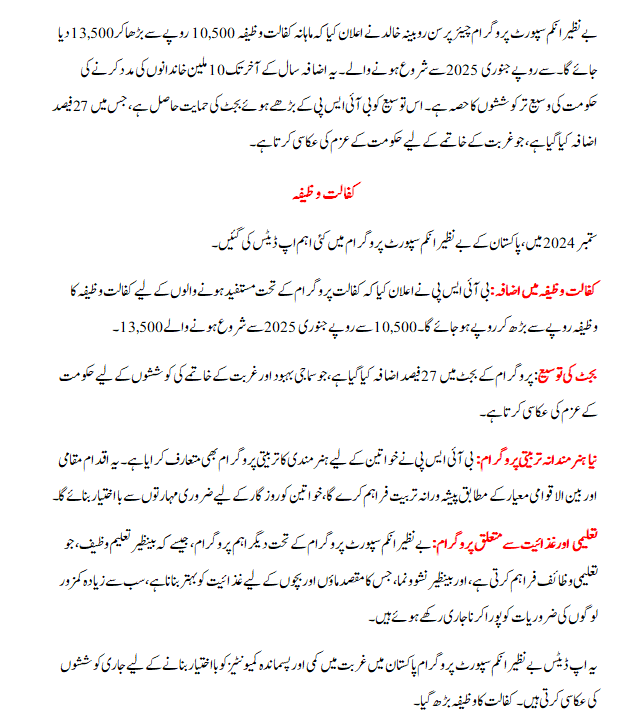Kafaalat stipend increased: As of September 12, 2024, there have been significant updates to Pakistan’s Benazir Income Support Programme (BISP). Chairperson Rubina Khalid announced that the monthly Kafaalat stipends will increase from Rs. 10,500 to Rs. 13,500 starting in January 2025. This increase is part of the government’s broader effort to support 10 million families by the end of the year. This expansion is backed by an increased BISP budget, which has been raised by 27%, reflecting the government’s commitment to poverty alleviation.
Kafaalat stipend
In September 2024, several important updates were made to Pakistan’s Benazir Income Support Programme (BISP):
- Increase in Kafaalat Stipend: BISP announced that the stipend for Kafaalat stipend increased for beneficiaries under the Kafaalat program will increase from Rs. 10,500 to Rs. 13,500 starting January 2025. This is part of the government’s broader plan to support 10 million families by the end of 2024.
- Expansion of Budget: The program’s budget has been expanded by 27%, reflecting the government’s commitment to social welfare and poverty alleviation efforts.
- New Skill Training Program: BISP has also introduced a skills training program aimed at women. This initiative will provide vocational training aligned with both local and international standards, empowering women with the skills necessary for employment. Kafaalat stipend increased
- Educational and Nutritional Programs: Other key programs under BISP, such as the Benazir Taleemi Wazaif, which provides educational scholarships, and Benazir Nashonuma, aimed at improving nutrition for mothers and children, continue to address the needs of the most vulnerable
These updates reflect BISP’s ongoing efforts to reduce poverty and empower disadvantaged communities in Pakistan. Kafaalat stipend increased.
You can Read Also: Ehsaas Program Registration Online 8171 2024 New Update

Kafaalat stipend increased from 10,500 to 13,500
The Kafaalat stipends under Pakistan’s Benazir Income Support Programme (BISP) are set to increase from Rs. 10,500 to Rs. 13,500 starting in January 2025. This increase comes as part of a broader government initiative to expand social safety nets and support up to 10 million families by the end of 2024. The stipend increase is also linked to a 27% rise in the BISP budget, underscoring the government’s commitment to alleviating poverty and empowering vulnerable populations.
Eligibility Criteria for Kafaalat stipend increased
The eligibility criteria for Kafaalat stipends can vary depending on the specific program and the country implementing it. However, generally speaking, Kafaalat stipends are financial aid programs aimed at supporting families in need, often in Islamic countries or regions with social welfare systems inspired by Islamic principles. Kafaalat stipend increased
you can Read also: CM orders payments via Himmat Cards by 15 September 2024
Here are some common eligibility criteria that might apply for Kafaalat stipend increased:
- Income Level: The family’s income typically needs to be below a certain threshold, which is set to ensure that aid reaches those who need it most.
- Family Size: The size of the family can impact eligibility, with larger families often qualifying for higher amounts of support. Kafaalat stipend increased
- Residency: Applicants usually need to be legal residents of the country where the stipend program is being offered.
- Citizenship: Some programs may require applicants to be citizens of the country or, in some cases, permanent residents.
- Employment Status: In some cases, the employment status of the household members may be considered. For instance, households with unemployed or underemployed members may be given priority. Kafaalat stipend increased
- Educational Attainment: Certain programs may have criteria related to the educational attainment of household members, especially if the stipend is tied to educational support.
- Special Circumstances: Programs may have additional criteria based on special circumstances such as disability, single parenthood, or other factors that impact a family’s financial situation.
- Application Process: Applicants typically need to go through an application process, providing necessary documentation to prove eligibility.
For the most accurate and specific information, it’s best to refer to the guidelines provided by the administering agency or organization responsible for the Kafaalat stipends in your region.
Documents Required for Kafaalat stipend increased
For the Kafaalat stipend, the required documents generally include:
- Identification: A government-issued ID (e.g., national ID card, passport) to verify identity.
- Proof of Income: Documents demonstrating household income, such as salary slips, income certificates, or bank statements.
- Proof of Residency: Documents showing your current address, like utility bills or a rental agreement.
- Educational Documents: For student stipends, proof of enrollment or academic records from the educational institution.
- Family Documents: If applicable, documents related to family status, such as marriage certificates or birth certificates for dependents.
- Application Form: Completed application form provided by the Kafaalat program.
- Bank Account Details: Sometimes, bank details are required for stipend disbursement.
It’s best to check with the specific Kafaalat program for the exact list of required documents, as these can vary.
Application Process for Kafaalat stipend increased
- Registration: Interested individuals need to register with the BISP through local BISP offices or designated registration centers.
- Document Submission: Applicants must provide required documents, including identification and proof of income.
- Eligibility Check: The application is reviewed, and eligibility is verified through a database check and socio-economic assessment.

Conclusion
In summary, Kafaalat stipend increased program has evolved to better serve its beneficiaries. Key changes from the previous to the new details include:
- Expanded Eligibility: The program now reaches a broader range of low-income and vulnerable groups, with more refined and streamlined eligibility criteria. Kafaalat stipend increased
- Increased Amount: Stipend amounts have been raised to better address the cost of living and inflation.
- Streamlined Application Process: The application process has been modernized with digital tools, making it easier for beneficiaries to apply and be verified.
- Enhanced Payment Frequency and Distribution: Payments are now more frequent and are distributed through more secure and efficient methods, including direct bank transfers and digital payment solutions.
These improvements aim to provide more effective support to those in need, ensuring the program remains responsive to the evolving needs of the population. For the most accurate and current information, referring to the BISP’s official resources is recommended.

FAQ’s
1. What is the BISP Kafaalat stipend?
The BISP Kafaalat stipend is a financial assistance program under the Benazir Income Support Programme (BISP) in Pakistan. It aims to provide monetary support to low-income families, especially vulnerable groups such as widows, orphans, and persons with disabilities.
2. Who is eligible for the BISP Kafaalat stipend?
Eligibility typically includes:
Low-income families.
Vulnerable groups like widows, orphans, and persons with disabilities.
Pakistani citizens who meet the socio-economic criteria set by the program.
3. How can I apply for the BISP Kafaalat stipend?
Online: Applications can often be submitted through the BISP’s online portal.
In-Person: You can apply at local BISP offices or designated registration centers.
Required Documents: Generally include identification, proof of income, and proof of residency.
4. How much is the BISP Kafaalat stipend?
The amount can vary and is periodically adjusted to reflect changes in living costs and inflation. For the most current stipend amount, check with BISP or their official website.
5. How often are payments made?
Payments are generally made on a monthly basis, but this can vary. The frequency of payments has been increased to provide more consistent support.
6. How are payments distributed?
Payments are usually made via:
Direct bank transfers to beneficiaries’ accounts.
Designated payment centers.
Digital payment solutions, including mobile banking.
7. What should I do if my application is rejected?
If your application is rejected, you can:
Review the Reason: Check the rejection reason provided.
Reapply: Address the issues mentioned and reapply if applicable.
Contact BISP: Reach out to BISP offices for further guidance and support.
8. How can I check the status of my application or payment?
You can check the status by:
Online Portal: Logging into the BISP’s online portal.
Contacting BISP: Visiting or calling your local BISP office.
9. What should I do if I change my address or bank account details?
Inform BISP of any changes in your address or bank account details by:
Updating Information: Through the BISP online portal or at a local BISP office.
Providing Documentation: Submit the necessary documentation to update your records.
10. How can I get more information or assistance?
For additional information or assistance:
Visit: Your local bisp ehsaas program office.
Call: The BISP helpline.
Check: The official BISP website for updates and contact details.

